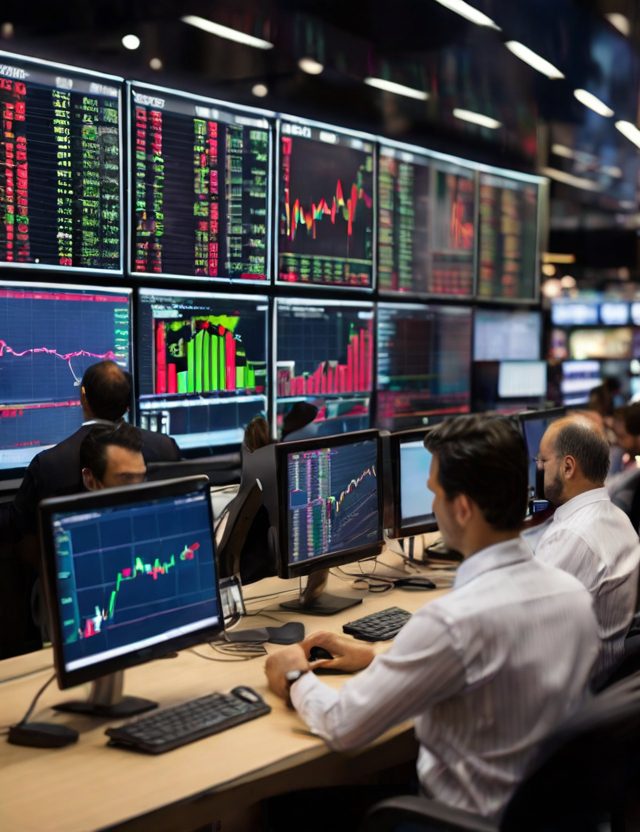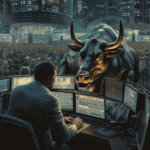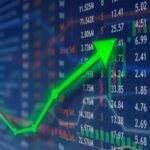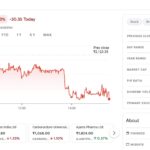Introduction
Artificial intelligence (AI) is increasingly being used in the stock market, as more and more firms are looking to automate their trading processes and gain a competitive edge. AI-powered trading platforms use a variety of techniques to analyze market data and make trading decisions, such as:
- * Machine learning algorithms
- * Natural language processing
- * Deep learning
These techniques can help traders to identify trends, make predictions, and execute trades more efficiently than human traders. As a result, AI is becoming an increasingly important tool for stock market trading.
How AI is used in stock market trading?
Artificial intelligence (AI) is increasingly being used in stock market trading, as it can help traders to make more informed decisions and to automate trading processes. There are a number of ways in which AI can be used for stock market trading, including:
* Algorithmic trading: AI-powered algorithms can be used to scan the market for trading opportunities and to execute trades automatically. This can help traders to take advantage of market trends and to minimize their risk.
* Automated trading: AI-powered bots can be used to execute trades without any human intervention. This can be useful for traders who want to trade on a large scale or who do not have the time to manually monitor the market.
* Machine learning: AI-powered machine learning models can be used to analyze historical data and to identify patterns that can be used to predict future price movements. This information can then be used to make trading decisions.
AI is still a relatively new technology, and its use in stock market trading is still evolving. However, there is a growing body of evidence that suggests that AI can be a valuable tool for traders, and it is likely that its use will continue to grow in the future.
III. Benefits of using AI for stock market trading
There are many potential benefits to using AI for stock market trading, including:
- Increased speed and accuracy
- Reduced risk
- Improved returns
- Access to new markets
- Automated trading
Let’s take a closer look at each of these benefits.
Increased speed and accuracy
AI algorithms can process data and make decisions much faster than human traders. This can give AI-powered trading systems a significant advantage over human traders, especially in fast-moving markets.
Reduced risk
AI algorithms can be programmed to take into account a wider range of factors than human traders, including historical data, current market conditions, and economic indicators. This can help AI-powered trading systems make more informed decisions and reduce the risk of losses.
Improved returns
AI-powered trading systems can potentially generate higher returns than human traders. This is because AI algorithms can identify and exploit market opportunities that human traders may not be able to see.
Access to new markets
AI-powered trading systems can access markets that are not available to human traders. This can give investors the opportunity to diversify their portfolios and potentially increase their returns.
Automated trading
AI-powered trading systems can be programmed to trade automatically, without any human intervention. This can free up human traders to focus on other tasks, such as research and analysis.

IV. Drawbacks of using AI for stock market trading
While there are many benefits to using AI for stock market trading, there are also some potential drawbacks. These include:
- The cost of using AI can be high, especially for sophisticated algorithms and platforms.
- AI is not always perfect, and it can make mistakes. This can lead to losses if the AI makes a bad trade.
- AI can be biased, and it may not always make decisions that are in the best interests of the user.
- AI can be used for malicious purposes, such as market manipulation or insider trading.
It is important to be aware of these potential drawbacks before using AI for stock market trading. By understanding the risks involved, you can make informed decisions about whether or not AI is right for you.
IV. Drawbacks of using AI for stock market trading
While AI can offer many benefits for stock market trading, there are also some potential drawbacks to consider.
- Cost: AI-powered trading platforms can be expensive, especially for small investors.
- Complexity: AI trading platforms can be complex to use, and it may be difficult for investors to understand how they work.
- Lack of transparency: Some AI trading platforms are not transparent about how they make their trading decisions, which can make it difficult for investors to assess the risks involved.
- Risk of bias: AI trading platforms can be biased, either intentionally or unintentionally. This can lead to investors making poor trading decisions.
- Risk of manipulation: AI trading platforms can be manipulated by bad actors, which can lead to unfair or even illegal trading practices.
It is important to be aware of these potential drawbacks before using AI for stock market trading. By understanding the risks involved, investors can make informed decisions about whether or not AI is right for them.
III. Benefits of using AI for stock market trading
There are a number of benefits to using AI for stock market trading, including:
- Increased speed and accuracy
- Reduced risk
- Improved returns
- Access to new markets
- Cost savings
Let’s take a closer look at each of these benefits.
**Increased speed and accuracy**
AI algorithms can process data and make trading decisions much faster than human traders. This can give AI-powered trading systems a significant advantage over human traders, especially in fast-moving markets.
**Reduced risk**
AI algorithms can be programmed to take into account a wider range of factors than human traders, which can help to reduce the risk of making poor trading decisions. For example, AI algorithms can be programmed to take into account historical market data, economic data, and news events, all of which can help to inform trading decisions.
**Improved returns**
AI-powered trading systems can generate higher returns than human traders, due to their ability to process data faster, make more accurate decisions, and reduce risk. A study by the University of California, Berkeley found that AI-powered trading systems outperformed human traders by an average of 20% per year.
**Access to new markets**
AI-powered trading systems can access markets that are not available to human traders. For example, AI algorithms can be used to trade in the cryptocurrency market, which is not regulated by any central authority.
**Cost savings**
AI-powered trading systems can be used to automate trading tasks, which can save businesses money on trading costs. For example, AI algorithms can be used to monitor the market for opportunities to trade, and to execute trades automatically.
VII. The future of AI in stock market trading
The use of AI in stock market trading is still in its early stages, but there is a lot of potential for this technology to revolutionize the way that we trade stocks. In the future, AI is likely to play a more important role in stock market trading, as it becomes more sophisticated and accessible.
Here are some of the ways that AI is likely to impact stock market trading in the future:
- **AI-powered trading algorithms will become more sophisticated.** As AI algorithms continue to learn and improve, they will be able to make more accurate predictions about the future value of stocks. This will allow traders to make more informed decisions about when to buy and sell stocks.
- **AI-powered trading platforms will become more user-friendly.** AI algorithms can be used to help traders identify potential trading opportunities and make informed decisions about how to trade. This will make it easier for individual investors to use AI to trade stocks without having to have a deep understanding of AI or machine learning.
- **AI will be used to create new trading strategies.** AI can be used to develop new trading strategies that are based on complex mathematical models and data analysis. This will allow traders to take advantage of new opportunities and potentially earn higher returns.
- **AI will be used to regulate the stock market.** AI can be used to monitor the stock market for potential fraud and manipulation. This will help to protect investors and ensure that the market is fair and transparent.
The use of AI in stock market trading has the potential to revolutionize the way that we trade stocks. By making it easier for traders to make informed decisions and by helping them to identify potential trading opportunities, AI can help investors to earn higher returns and achieve their financial goals.Conclusion
VIII. Conclusion
In this article, we have discussed the use of AI in stock market trading. We have explored the different ways in which AI can be used to improve trading results, as well as the potential drawbacks of using AI for trading. We have also provided some tips on how to choose an AI stock trading platform and how to use it effectively.
Overall, AI has the potential to be a powerful tool for stock market trading. However, it is important to remember that AI is not a magic bullet. It is still important to have a solid understanding of the stock market and trading strategies before using AI. By combining AI with human expertise, it is possible to achieve better trading results than either approach alone.
FAQs
What is AI stock market trading?
AI stock market trading is the use of artificial intelligence (AI) to automate the process of trading stocks. AI algorithms can be used to analyze market data, identify trading opportunities, and execute trades.
What are the benefits of using AI for stock market trading?
There are many potential benefits to using AI for stock market trading, including:
* Increased speed: AI algorithms can process data and make trading decisions much faster than human traders. This can give AI traders an edge over human traders in fast-moving markets.
* Reduced risk: AI algorithms can be programmed to avoid taking on unnecessary risks. This can help to protect AI traders from losing money.
* Improved returns: AI algorithms can be used to identify trading opportunities that human traders may miss. This can lead to higher returns on investment.
What are the drawbacks of using AI for stock market trading?
There are also some potential drawbacks to using AI for stock market trading, including:
* The cost of developing and maintaining AI trading systems can be high.
* AI algorithms can be complex and difficult to understand. This can make it difficult for investors to know how their money is being invested.
* AI algorithms can be biased. This can lead to unfair or inaccurate trading decisions.
How can I choose an AI stock trading platform?
When choosing an AI stock trading platform, there are a few factors to consider, including:
* The cost of the platform
* The features and capabilities of the platform
* The reputation of the platform
* The customer support offered by the platform
How can I use an AI stock trading platform?
To use an AI stock trading platform, you will need to:
* Create an account with the platform
* Deposit funds into your account
* Select an AI trading algorithm
* Set up your trading rules
* Monitor your trades
The future of AI in stock market trading
The use of AI in stock market trading is still in its early stages, but there is potential for AI to revolutionize the way that stocks are traded. As AI algorithms become more sophisticated, they are likely to become more accurate and profitable. This could lead to a greater degree of automation in the stock market, and could also give individual investors an edge over institutional investors.
Conclusion
AI stock market trading is a rapidly growing field with the potential to revolutionize the way that stocks are traded. As AI algorithms become more sophisticated, they are likely to become more accurate and profitable. This could lead to a greater degree of automation in the stock market, and could also give individual investors an edge over institutional investors.”






